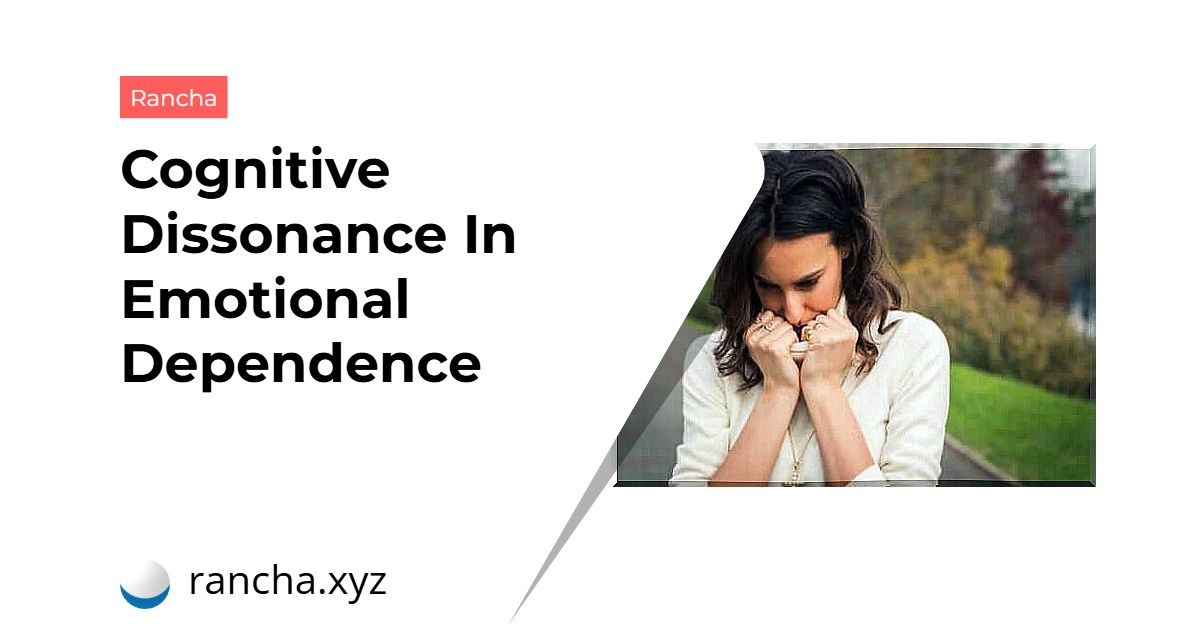Cognitive dissonance is a classic concept in psychology, coined by psychologist Leon Festinger in 1957. In short, it refers to the fact that people often strive to maintain an internal coherence between their beliefs, values and behaviors.
When this balance is threatened, the person feels very uncomfortable. Consequently, an interest in reestablishing it arises.
Cognitive dissonance is a very common psychological effect. All of us, to a greater or lesser extent, have experienced it at some point. In this article, we will focus on the effect of cognitive dissonance on emotional dependence (state).
We are often not aware of this dissonance. When detecting it on this plane, it is common to put into practice different strategies, also unconsciously, to face it.
In this way, we either trivialize our conduct ( “It doesn’t matter” “We’re going to die for some reason anyway” ) or we deceive ourselves ( “I’m sure everything will change” ).
In other situations, we can also change our own opinion, try to influence others to change theirs and even generate strategies for other people to stop being similar ( “Yes, it’s true that she died of cancer, but she had a family history . I don’t have.” ).
Cognitive dissonance in emotional dependence is a very common theme. When someone is immersed in a toxic relationship, deep in their being that person knows that the ideal would be to get out of this situation. But on the other hand, something prevents her from doing that.
Then, there is a clash between the fear of loneliness and going through a situation of suffering, with the discomfort one feels daily for being in a destructive relationship.

When the “should” clashes with the “need”
Cognitive dissonance in emotional dependence arises when a person feels that each day he or she is part of a sentence alongside the other person. Whether because the other humiliates her, nullifies her, acts aggressively, critically, infidelity, etc.
The result is that, progressively, the dependent person’s self-esteem is increasingly affected.
The moment a person who is emotionally dependent has a moment of clarity, opens his eyes and is able to contemplate this reality, he becomes aware of the pain he is feeling. In this trance, his thoughts turn to the idea of “I must get out of this relationship because it hurts me”.
Unfortunately, emotional dependence carries an even more powerful aspect in its gut: the fear of rejection or loneliness. The fear of being alone with yourself. Therefore, that moment of lucidity we talked about quickly disappears.
Instead of acting according to the idea of “I must get out of this relationship” and be coherent, the person takes refuge in “I need this person not to be alone” and, therefore, maintains the usual conduct.
Cognitive dissonance in emotional dependence becomes even more unpleasant when the environment, from its own point of view, clearly sees that the person should end the relationship.
Therefore, with the best of intentions and with the intention of helping, messages and tips appear on how to act: But don’t you see that the other is being unfaithful? You shouldn’t accept being yelled at, finish before it’s too late.
This, of course, generates a much greater internal conflict, and the dependent individual may even come to repudiate these people or sever these relationships to prevent them from causing further dissonance.
Cognitive dissonance in emotional dependence increases as more people, especially if they matter to us, are at odds with how we are behaving.

Cognitive Dissonance in Emotional Dependence: Excuses and Self-deception
Within the framework of toxic relationships, excuses and self-deception are common to reduce the discomfort produced by cognitive dissonance. In this way, people end up believing, as if it were real, what was generated by their minds in order to maintain the idea of coherence.
Cognitive dissonance in emotional dependence gives us clues as to how to detect this self-deception. The aspect that stands out the most is the emotional.
When a person is in a harmful relationship and yet their conduct is inconsistent with that fact, they feel uncomfortable. Sometimes, he can even suffer a depressive episode, with all that this involves: insomnia, lack of appetite, apathy, etc.
Another of the tips to realize that we are deceiving ourselves is to think about the possible ending and feel it as if it were a deep abyss. In this sense, we will certainly feel an intense fear of uncertainty caused by a possible future with changes.
This can be translated into an extreme need to be by the side of the “beloved”, not so much out of love, but because I think that it will not be possible to be alone: I don’t trust my abilities, my resources, my potentials, etc.
Recourse to therapy is essential in order to bring out all those mind tricks with which we try to secure ourselves a known, albeit unwanted, future.
In this sense, psychological therapy can help us reduce dissonance using strategies that are not harmful to ourselves. The idea is to take steps that lead us to the path of facing reality.
 rancha.xyz Be free to choose their own route to self-knowledge, health and balance of body and soul.
rancha.xyz Be free to choose their own route to self-knowledge, health and balance of body and soul.




